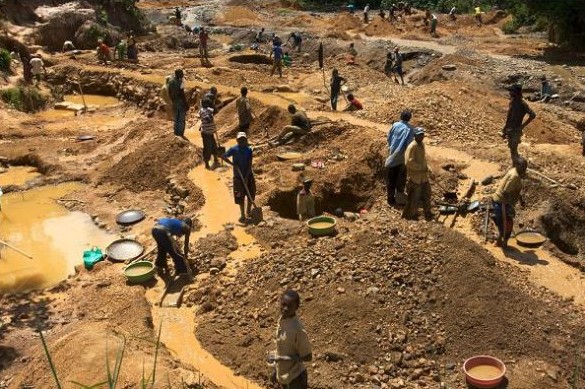The Upper Denkyira East Municipality has lost its huge acres of arable and swampy lands reserved for extensive rice and vegetable production, to widespread illegal mining activities also called ‘galamsey’.
Mr. Obeng Nimoh, the Municipal Director of Agriculture told the Ghana News Agency, “Every evening, before nightfall, young miners trekked in single file, holding up pickaxes, head pans, hammers, and shovels to their sites to mine.
“They cut trees, excavate the ground, overturn rocks, and shove the rubble into the rivers. This has clogged the near stagnant water bodies around with mud thereby affecting irrigation.”
The Municipal Director of Agriculture expressed worry about the onslaught by the illegal miners on agricultural lands without regard to the dire consequences of their activities on the environment and national food security.
He underscored that the national fight against the menace remained an unsurmountable national disaster in waiting, if not tackled holistically with a bottom-up urgency approach.
Mr. Nimoh described the situation as dire in communities such as Opponso, Buabenso, Fawomanye, Denkyira-Fosu, Asmah-Camp, Kyekyewere, Akropong, Adwumam, Pokukrom, and Mmeredane.
In the farming communities, he narrated the vast devastation of acres of the marshlands where many had subsisted for years.
“You can see the way illegal miners have devastated not just the rice farms and vegetables but other crops as well. This is a sad situation that had destroyed the backbone of the country’s economy,” he lamented.
To him, illegal mining had not only degraded agricultural lands but decreased lands for agricultural production, resulting in the shortening of the traditional fallow period.
In principle, the Municipal Director of Agriculture explained that mining and agriculture were both pathways out of unemployment and poverty.
However, a disequilibrium can result in collateral damage for any economy; a situation where one sector grows abnormally or is mismanaged diminishes the progress of the other.
Mr. Nimoh noted that many smallholder farmers were regrettably wallowing in abject poverty and guilt after selling their farmlands to either illegal miners or multinational mining companies and misusing their proceeds from the sale.
He suggested that the mining sector management transition the degraded landscapes by planning trees, focus on poverty eradication and optimize the ecosystem for better livelihoods and more sustainable economic returns.
He asked farmers to stop selling arable lands to illegal miners saying, “the unsustainable practices could jeopardize the future of the young generation.”
“I suggest the traditional authorities, government, and the security agencies collaborate to effectively end the menace” he added.
Latest Stories
-
Cucumbers – Making the most of them
1 hour -
Revenue growth to slowdown to GH¢209.3bn in 2025; T-bills will not be restructured – IC Research
3 hours -
Deloitte celebrates end-of-year Thanksgiving Service
3 hours -
Inflation to end 2025 between 10% and 12% – Databank Research
3 hours -
Government’s commitment to fiscal consolidation to remain strong in 2025
3 hours -
ImageBureau, April Communications take theatre to Nsawam Prisons
4 hours -
Bird flu kills 20 big cats at US animal sanctuary
4 hours -
Your peaceful conduct saved the country from tension – Clergymen commend Bawumia
4 hours -
A Nite of 1031 Laughs & Music to provide emergency insurance for patrons
4 hours -
Body found in wheel well of United plane after landing in Hawaii
4 hours -
Ghana Armed Forces dismisses viral audio alleging ammunition transfer
4 hours -
Former Hohoe MP Bernice Adiku Heloo passes on
6 hours -
CODEO calls for re-run of Ablekuma North, Dome Kwabenya parliamentary elections
6 hours -
4,155 cholera cases with 35 deaths recorded by December 23 – GHS
7 hours -
Mothers celebrate arrival of Christmas Day babies at Ridge Hospital
9 hours

